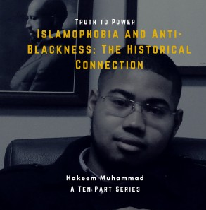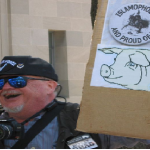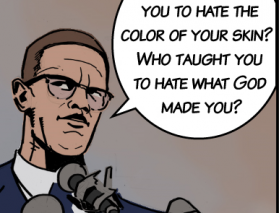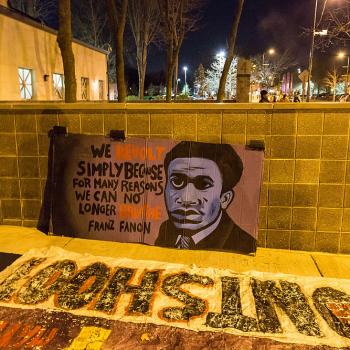In The Oppression of Muslim Women by White Supremacy, we learned how when it comes to Islam, white supremacy commodifies and discards narratives of women’s oppression based upon its own strategic interest. For example, the narratives of black Muslim women such as Safiya Bukhari and Tynetta Muhammad, who utilized Islam as a source of empowerment against the structural racism that they were subjected to in America, garner no where near the sympathies or attention by mainstream society as that of Ayaan Hirsi Ali. In fact, white supremacy has maintained as concealed a dark secret at the foundations of America.

Having been kidnapped from West Africa and taken to the Americas at the tender age of seven, Phillis Wheatley became world renowned for being the first published African-American poet. As the forebear of African-American literature, her literary works were read worldwide even by heads of states such as George Washington and eminent philosophers such as Voltaire.
In the Emergence of African-American Literacy Traditions: Family and Community, Phyllis M. Belt-Beyan notes a rarely mentioned fact about Phillis Wheatley: “About two weeks after she was brought to work for the Wheatley household, Wheatley peters was writing Arabic symbols on chalk slate and on walls” Though it was illegal for slaves to learn to read and write, Wheatley’s constant writing was observed by her owners and motivated them to educate her more.
A true prodigy, Shields writes that Wheatley “learned to read and write in English and Latin within the first year or so of her coming to the American colonies.” Remarkably, at the young age of thirteen, Phillis Wheatley published her first work. While Wheatley gained worldwide fame for her poetry, there is a lesser known fact about Phillis Wheatley, one that shakes western modernity to its core.
From her geographic origins emanating from Gambia, to her ability to write Arabic as a young kid, to her most likely ethnic background being Fulani, Professor Will Harris indicates that this could very well mean the “progenitor of African-American literature probably was Muslim.” The story of Phillis Wheatley presents a major critique of the “white male savior complex” by which western governments feign concern for Muslim women. While positing itself as the savior of Muslim women, at the foundation of the United States, we have a Black Muslim woman subjected to immense violence in the Middle Passages and forcibly converted to Christianity. This completely dismantles the American exceptionalist narrative that boasts of “the freedom of religion”—a right that was never extended to slaves.
While contemporary Islamophobic discourse often promotes that idea of Muslims imposing “Sharia Law” upon others leading to widespread barbarity and oppression of women, Wheatley’s life is that of a black muslim woman whom had “Eurocentric Law” violently imposed upon her. The story of Philis Wheatley disrupts this narrative.
Additionally, the life of Wheatley exposes the islamophobic narrative that has sought to create a caricature of Islam as a religion that inherently oppresses women, denying them equitable access to education.
 As Will Harris notes “the slave child’s rapid progress in learning to read, write, and speak English was likely the result of nominal instruction in language acquisition she already obtained in an Islamic school system before being kidnapped into slavery.” In other words, Islamic centers established in West Africa played a pivotal and integral role in enabling Phillis Wheatley to eventually become the dynamic poet, author, and pioneer of African-American literature that she became. The early Islamic education of Wheatley enabled her greater social mobility and a plethora of educational opportunities that would have been denied to other slaves in America.
As Will Harris notes “the slave child’s rapid progress in learning to read, write, and speak English was likely the result of nominal instruction in language acquisition she already obtained in an Islamic school system before being kidnapped into slavery.” In other words, Islamic centers established in West Africa played a pivotal and integral role in enabling Phillis Wheatley to eventually become the dynamic poet, author, and pioneer of African-American literature that she became. The early Islamic education of Wheatley enabled her greater social mobility and a plethora of educational opportunities that would have been denied to other slaves in America.
In a thorough comparative analysis of her poetry and Al-Fatihah in the Qu’ran, Will Harris in Philis Wheatley: The Muslim Connection, writes that,”“Wheatley mimics the language of this Qur’anic verse in her hymn.” However, it is also true that in other poetry, Wheatley extols the virtues of Christianity:“Twas mercy brought me from my Pagan land, Taught my benighted soul to understand.” Here Whatley lauds Christianity for taking her from her captivity in Africa and bringing her to Americas. Yet, Harris even suggests that based upon a plethora of Islamic allusions within Wheatley’s work that she could have in fact remained Muslim while outwardly expressing Christianity,– a practice adopted as a survival technique by several slaves.
However, it is also a possibility that Wheatley did in fact truly become Christian. Unlike other African Muslim slaves such as Omar Ibn Said and Abdul-Rahman Ibrahim ibn Sori who were kidnapped and taken to the Americas as adults after completing extensive Islamic education, Philis Wheatley was brought to the Americas at age seven. With her Islamic education interrupted at such a young age, she could have in fact been more susceptible than other adult Muslim slaves to the widespread Christian missionary efforts that characterized the slave system.
Whatever the case may be,Wheatley’s life exposes a blatant hypocrisy and the need to study the oppression of Muslim women under white supremacy. Though kidnapped and forced to live life as a slave in the United States, her early Islamic education enabled her with the tools to rise above the odds in a white supremacist society order to become a dynamic poet and author. As American exceptionalist discourse promotes itself as “the savior of Muslim women”, we should remember the life of Philis Wheatley, a black woman whose early Islamic education was completely disrupted as a result of the transatlantic slave trade.












